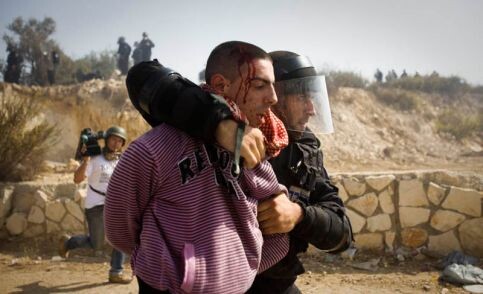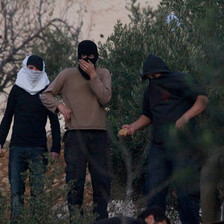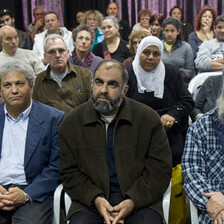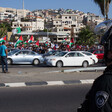The Electronic Intifada 28 October 2010

An Israeli police officer detains a Palestinian during clashes provoked by right-wing extremists in Umm al-Fahm. (Oren Ziv/ActiveStills)
Israeli police injured two Arab legislators on Wednesday in violent clashes provoked by Jewish right-wing extremists staging a march through the northern Arab town of Umm al-Fahm.
Haneen Zoabi, a parliament member who has become a national hate figure in Israel and received hundreds of death threats since her participation in an aid flotilla to Gaza in the summer, was among those hurt.
Zoabi reported being hit in the back and neck by rubber bullets as she fled the area when police opened fire. In an interview, she said she believed she had been specifically targeted by police snipers after they identified her.
Police denied her claims, saying they had used only tear gas and stun grenades.
Some 1,500 police were reported to have faced off with hundreds of Palestinian citizens of Israel and Israeli Jewish demonstrators in the town.
Shimon Koren, the northern police commander, admitted special paramilitary forces had been used against the counter-demonstration by Palestinian citizens of Israel, as well as an undercover unit more usually deployed at Palestinian protests in the occupied West Bank.
An officer disguised as an Arab demonstrator, from the so-called mistaravim unit, was among the injured, apparently after police fired a stun grenade at him by mistake (mistaravim is a Hebrew-language word meaning “disguised as an Arab”).
Zoabi harshly criticized the police violence. “The police proved that they are a far more dangerous threat to me and other Arab citizens than the fascist group that came to Umm al-Fahm,” she said.
The march was organized by far-right settlers allied to Kach, a movement that demands the expulsion of Palestinians from both Israel and the occupied territories. The movement was formally outlawed in 1994, but has continued to flourish openly among some settler groups.
The organizers said they were demanding the banning of the Islamic Movement, which has its headquarters in Umm al-Fahm.
The Islamic Movement’s leader, Sheikh Raed Salah, has angered Israeli officials by heading a campaign in Jerusalem’s Old City to highlight what he says is an attempted Israeli takeover of the Haram al-Sharif compound that includes the al-Aqsa mosque.
He was also on the Mavi Marmara aid ship to Gaza in May, and claimed at the time that Israeli commandos had tried to assassinate him. Nine passengers were killed, some of them by close-range shots to their heads.
The sheikh is currently serving a three-month jail sentence over clashes with the Israeli security forces close to the al-Aqsa mosque.
Michael Ben Ari, a former Kach member and now an MP with the right-wing National Union party, who attended the march, said Israel must not be a “stupid democracy and let people who want to destroy us have a voice.”
Baruch Marzel, one of the march organizers, told Israel Radio: “If the Kach Party was outlawed, then the Islamic Movement deserves to be outlawed 1,000 times over.”
On hearing of Zoabi’s injuries, he added: “It was worth going to Umm al-Fahm. She is our enemy.”
Afu Aghbaria, a Palestinian citizen of Israel MP with the joint Jewish-Arab Communist party, was also hurt. He said he had been hit in the leg.
Leaders among Palestinian citizens in Israel said the clash had been triggered by undercover police who began throwing stones from among the demonstrators — a tactic that the unit has been caught on film using at protests in the West Bank.
Mohammed Zeidan, head of the Higher Follow-Up Committee, the main political body for Israel’s Palestinian citizens, who comprise a fifth of the total population, condemned the police actions.
“Racism is no longer found only in documents or on the margins, like with Marzel, but has become a phenomenon among decision-makers and carried out on the ground. What happened today in Umm al-Fahm is a menacing escalation.”
The committee demanded a state investigation into what it called “exaggerated violence” by the police.
Police said nine Arab demonstrators had been arrested for stone-throwing.
Four police officers were reported to be lightly injured. The far-right marchers were escorted away by police, unharmed.
Zoabi, a first-term MP, shot to notoriety this summer after she was among the first passengers to be released following Israel’s violent takeover of the Mavi Marmara.
Zoabi contradicted the Israeli account that the nine passengers had been killed by commandos defending themselves, accusing the navy of opening fire on the ship before any commandos had boarded. She also claimed several passengers had been allowed to bleed to death.
She was provided with a bodyguard for several weeks after receiving a spate of deaths threats and general vilification in the parliament.
The Israeli police have been criticized in the past for lying about the strong-arm methods used to quell protests by the country’s Palestinian citizens.
A state commission of inquiry found in 2003 that the police had used live ammunition and rubber bullets, in violation of its own regulations, to suppress solidarity demonstrations inside Israel at the start of the second Palestinian intifada.
Thirteen Palestinian citizens were killed and hundreds injured in a few days of clashes in 2000. Police had falsely claimed that the deaths had been caused by “friendly fire” from among the demonstrators.
A recently parliamentary report revealed that there were only 382 Muslims in Israel’s 21,000-strong national police force — or less than two per cent.
The establishment of the undercover mistaravim unit against the country’s Palestinian population caused outrage among civil rights groups when it was first revealed last year.
The far-right march in Umm al-Fahm was timed to coincide with the twentieth anniversary this week of the assassination of Rabbi Meir Kahane, who founded Kach. At a commemoration service in Jerusalem on Tuesday, Rabbi Yisrael Ariel told hundreds who attended that the government was allowing the Palestinians to “establish an Ishmael state in Israel.”
Jonathan Cook is a writer and journalist based in Nazareth, Israel. His latest books are Israel and the Clash of Civilisations: Iraq, Iran and the Plan to Remake the Middle East (Pluto Press) and Disappearing Palestine: Israel’s Experiments in Human Despair (Zed Books). His website is www.jkcook.net.
A version of this article originally appeared in The National, published in Abu Dhabi.





